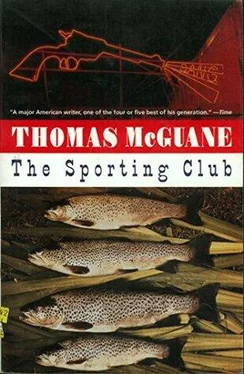“I’m a member.”
“What?”
“I’m a member.”
“So what?”
“This is my club. I’m a member and I won’t get out.”
“Kid—”
“I won’t get out.”
“Kid, lissename—” Spengler’s Brooklyn accent was brand new. “There’s a hundred million bums in a world, will ya lissename?”
“Give me that gun.”
“Not on your life.”
“Give me the gun or I’ll take the gun and kill you with it.” Spengler gave him the gun. “I have a good mind to kill you with this.”
“What’d I ever do to you?”
“Stuck it in my belly. I ought to kill you and burn your chronicle.”
“I didn’t mean anything by it. I treated you like a Dutch uncle. Honest.”
“I’ve got a good mind to cream your guts all over the bushes.”
“Oh, don’t even talk like that—”
“I’m sick of what’s going on around here.” Quinn was glad to have the gun. Spengler was crazy all right. Maybe now he would go home. Quinn wondered how many of these zanies were similarly armed. He looked over at Spengler, very much down in the mouth, his brief time in the military sun a thing of the past. Quinn gave him a little bump on the shoulder with his fist just to show that it would be fine again one day, that things would turn out like old times. Quinn unloaded the gun and went up. He found Fortescue polishing his boots outside the canvas ledge and lifted his head with the end of the automatic rifle. Fortescue’s expression of cynicism tightened and confirmed itself. “So you’ve gone over—”
“No.” Quinn leaned the gun up against the canvas and hunkered near Fortescue.
“Where’d you get the gun?”
“I had it, see?”
Fortescue’s eyes flicked over it once.
“Just like the ones I got from the National Guard.”
“Well, it’s a common enough gun,” Quinn said sharply.
“Still and all—”
Quinn noticed people beginning to treat him with respect. A heavy woman in desolating, elasticized underwear stepped out from under the ledge and emptied a pot; she paused odiously, her back to them, one hand behind her stretching a rubber strap absentmindedly, then lifted her head to ogle the firmament. There was the harsh scent of the pot’s contents. The light of lanterns, stoves, cooking fires, flashlights, flickered out from under the ledge as Quinn went along. Among the members, Quinn spotted a few old woodsmen, local guides hired on as mercenaries. The guides were doing the cooking and thrusting out sections of the unwieldy canvas on green poles to form flies under which you could be sheltered.
Everyone visible seemed weary. Of these, the most voluptuously weary was Charles Murray. His weariness was of the staring, fixed variety that one associates with trench warfare on the old Western Front; you saw in his eyes the blind light of phosphor and star shells over a barbed-wire no man’s land; you saw night raids that featured the bayonet and its use. But instead of sappers and subalterns you saw cranky children on a hot July night with mothers and fathers throwing themselves into sudden squalor with slackness that would have appalled Gypsies. Fortescue caught up with him again. “Naturally the camp is in confusion. You might say that at this stage of the proceedings confusion is necessary and desirable. Strategic even. Operationally, we’re right on schedule.”
“I didn’t ask you to explain yourself.”
“Oh, boy.”
“What do you want with Earl Olive anyway? What are you going to do with him?”
“Interrogate him.”
“After that?”
“First we’re going to interrogate him and then we’re going to interrogate him.”
“Give him a little of his own.”
“All right.”
“And you think that’s okay.”
“All right, sure. We think it’s okay.”
“A tit for a tat.”
“There you go,” said Fortescue emphatically. “Now you’re getting real close to what we have in mind.”
“Well, here’s one from left field: I won’t allow it.”
“What can you do?”
“Turn you over to the authorities.”
“Like who?”
“Like the sheriff of Pere Marquette,” Quinn said promptly. “The sheriff of Pere Marquette—” It was sonorous.
“I can be of some use there,” said Fortescue. “I am his deputy.” He showed the card in its plastic panel, the wallet fanned with celerity. “Why don’t you call on me? I am deputy or assistant chief to every law enforcement officer in this part of the state of Michigan. Why not call on me and see if I can’t solve your problem?”
“I guess you’ve got me.”
“I guess I’ve got you by the nuts.”
* * *
Stanton answered: “I am always ready to present Mr. Earl Olive, address unknown, with his choice of weapons. Only fair thing to be done. I perhaps overcredit Sir Olive. That is to say that I don’t think he would do the same for me. In fact, I’m confident that something in the back would be more his line of products. Not that I would fear that. When a man’s up to his blowhole in the higher virtues, he cannot be stopped by weaponry. I expect to be among those savages within the hour, a trusted if shopworn student of their revolution.” He was repacking his rucksack now and sat on his heels before it. He pressed into it skillfully a lightweight sleeping bag, a nested aluminum cook kit, an assortment of freezedried food, brown rice, fruit salad, vitamin supplements, Milky Way candy bars, a compass with a rotating dial, a pint of cognac, a pair of dueling pistols, a pair of dirks, a pair of short swords, On Your Own in the Wilderness by Bradford Angier and a manual of guerrilla tactics by Ernesto “Che” Guevara. “I’ll see you on the Fourth of July.”
“That’s tomorrow.”
“So it is. Let’s do our club and country proud.”
“I see that we will.”
* * *
Quinn went to see Janey. He believed that if he kept showing up, something would break, an old delusion that substituted exposure for action. He took his time. It seemed so quiet. The old generator at the main lodge was silent now and it made an extraordinary difference. It had dominated a thousand acres of forest like a rhythm section. Now he felt the difference between this place and the world he lived in. It had taken a long time to shed Detroit; but once shed, it seemed uncannily remote. Not that he had forgotten the disaster that awaited him for failing to arrange the factory picnic or for ignoring the accounts Mary Beth was antagonizing; but still Detroit seemed remote enough that Quinn had to use his imagination to believe that any other life than this transpired; he didn’t altogether believe that his punch presses and toolmaking machines still cavorted in their mechanical ecstasies, that his employees shuffled beside them, that Mary Beth still typed away between lunch hour assignations. He was not now even sure that his father snuffed cigarettes with sausage fingers in the blind West Indian sun, that his mother shook her head four times a year over his father’s cardiogram and tried to talk him out of raiding back to Detroit to bully, wheedle and cajole the company into spasms of output and profit; for Quinn, it had all stopped; there was only this life and its details: he had adapted as animals adapt when they learn to live in a zoo, to eat, sleep and breed under a shower of peanuts and popsicle wrappers.
He looked up to see Janey in the highest window. She beckoned and he trotted toward the house thinking, What in the name of God, can this be it? The steps sailed by three at a time and he was in the room. Janey waved him past to the window. He took the binoculars from her in disappointment and looked, moving them back and forth. Rivers of green poured into each eye. He elevated the glasses to the fissured brown of the lake. There he was. He was dancing on the lake bed with great seriousness, his jaw pressed against his chest, his underlip thrust out; he flapped his arms with a slow condor motion while his feet carried his scurrying in widening gyres. Suddenly, he threw his head back and Quinn was sure he imitated the cry of some raptorial bird. Then he put the rucksack back on and moved away with the heavy fluency of a prizefighter. The man’s a loony, thought Quinn as he turned to Janey; will that clear the air? Scarcely. She thought it was funny. Quinn wanted to make her see that people didn’t live like this; but what was the use. No one was going to get her away from Bird Man out there.
Читать дальше












